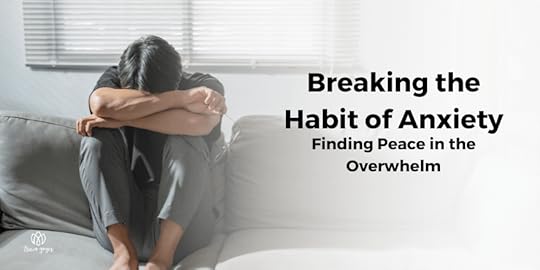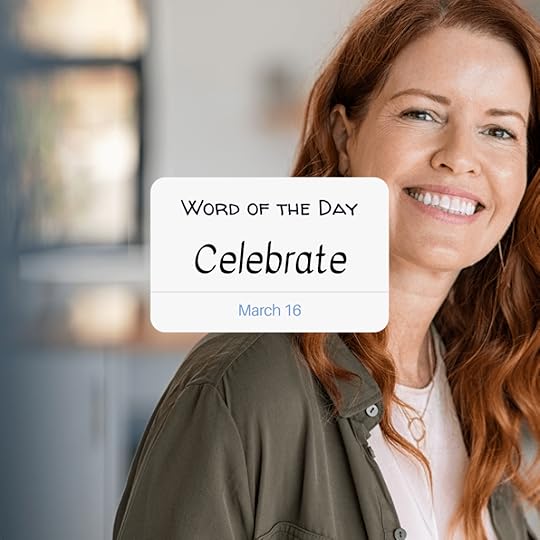Breaking the Habit of Anxiety
I remember a season in my life when anxiety felt like a constant companion. No matter what I did, it was always there—lingering in the back of my mind, whispering worst-case scenarios, making my heart race over things that hadn’t even happened yet. Maybe you’ve felt that way, too.

The world tells us that anxiety is just a part of life. But what if I told you that anxiety isn’t just an emotion—it can be a habit? Ed Mylett, a well-known speaker and entrepreneur, teaches that our brains create patterns based on what we repeatedly do and think. If we constantly respond to stress with worry, our minds start making that our default reaction. Anxiety becomes our go-to habit, even when there’s no real danger.
But here’s the truth: God did not create us to live in fear.
The Bible tells us in 2 Timothy 1:7 (NLT):"For God has not given us a spirit of fear and timidity, but of power, love, and self-discipline."
If anxiety is a habit, that means we can break it—and replace it with a mindset of peace, trust, and resilience.
Why Do We Struggle with Anxiety?First, let’s acknowledge the real reasons why we feel anxious:
 Unrealistic Expectations – We pile too much on our plates, thinking we have to do it all, be it all, and never fall behind. When we can’t keep up, we feel overwhelmed.
Unrealistic Expectations – We pile too much on our plates, thinking we have to do it all, be it all, and never fall behind. When we can’t keep up, we feel overwhelmed. Fear of the Unknown – We want to control the future, but when things feel uncertain, our minds race with worry.
Fear of the Unknown – We want to control the future, but when things feel uncertain, our minds race with worry. Comparison Culture – Social media makes it easy to compare our behind-the-scenes struggles to someone else’s highlight reel, leaving us feeling “not good enough.”
Comparison Culture – Social media makes it easy to compare our behind-the-scenes struggles to someone else’s highlight reel, leaving us feeling “not good enough.” Lack of Rest – God created us to work from rest, not work until we collapse. When we’re constantly on the go, anxiety builds up.
Lack of Rest – God created us to work from rest, not work until we collapse. When we’re constantly on the go, anxiety builds up. Trying to Carry It Alone – Anxiety grows when we keep our struggles hidden instead of bringing them to God and trusted people.
Trying to Carry It Alone – Anxiety grows when we keep our struggles hidden instead of bringing them to God and trusted people.
Jesus invites us to do something radical with our anxiety. Instead of carrying it alone, He says:
"Give all your worries and cares to God, for he cares about you." —1 Peter 5:7 (NLT)That means we don’t have to stay stuck in anxious patterns. We can break the habit and create a new way of thinking.
How to Break the Habit of AnxietyAnxiety doesn’t disappear overnight. But just like replacing a bad habit with a good one, we can train our minds to respond differently to stress.
1. Recognize Anxiety for What It IsAnxiety thrives in the shadows. The first step to overcoming it is bringing it into the light.
 Ask yourself: Is this worry based on truth, or is it based on fear?
Ask yourself: Is this worry based on truth, or is it based on fear? Write it down: When a worry pops into your head, write it in a journal. Seeing it on paper helps you process and pray over it instead of replaying it.
Write it down: When a worry pops into your head, write it in a journal. Seeing it on paper helps you process and pray over it instead of replaying it. Speak truth over fear: Replace your anxious thoughts with God’s promises.
Speak truth over fear: Replace your anxious thoughts with God’s promises.
 Biblical Truth to Replace Anxiety:
Biblical Truth to Replace Anxiety:
"Don't worry about anything; instead, pray about everything. Tell God what you need, and thank him for all he has done. Then you will experience God’s peace, which exceeds anything we can understand." —Philippians 4:6-7 (NLT)2. Change How You Start Your Day
If you wake up and immediately scroll social media, check emails, and rush into your schedule, your brain is already in reactive mode. Instead, start your day with intentional peace.
 Pray before you reach for your phone.
Pray before you reach for your phone.
 Listen to worship music while getting ready.
Listen to worship music while getting ready.
 Speak life over yourself (“God is with me today. I will not be afraid.”).
Speak life over yourself (“God is with me today. I will not be afraid.”). Read Scripture, even if it’s just 5 minutes before the world’s noise fills your mind.
Read Scripture, even if it’s just 5 minutes before the world’s noise fills your mind.
 Morning Verse for Peace:
Morning Verse for Peace:
"This is the day the Lord has made. We will rejoice and be glad in it." —Psalm 118:24 (NLT)3. Stop Expecting Perfection (Overwhelm is a Choice!)
I once heard someone say, “Overwhelm is a choice.” At first, I disagreed. Surely, we don’t choose to feel overwhelmed, right?
But then I realized… a day is just a day. It’s the expectations we put on it that make it feel impossible.
If you go into your day thinking: I have to get EVERYTHING done.
I have to get EVERYTHING done.
 I can’t make any mistakes.
I can’t make any mistakes.
 I must keep everyone happy.
I must keep everyone happy.
…you will feel overwhelmed before you even start.
Instead, try this: Prioritize 3 things you must get done today instead of a never-ending list.
Prioritize 3 things you must get done today instead of a never-ending list. Accept that progress is better than perfection.
Accept that progress is better than perfection.
 Give yourself grace—God doesn’t expect perfection from you, so why should you?
Give yourself grace—God doesn’t expect perfection from you, so why should you?
 Freedom from Perfection Verse:
Freedom from Perfection Verse:
"My grace is all you need. My power works best in weakness." —2 Corinthians 12:9 (NLT)4. Focus on What You Can Control
Many times, anxiety comes from focusing on things we can’t control—the future, other people’s opinions, unexpected problems. Instead of wasting energy on the unknown, focus on what you can do.
 You can control how you talk to yourself.
You can control how you talk to yourself.
 You can control how you respond to stress.
You can control how you respond to stress.
 You can control how much time you spend with God.
You can control how much time you spend with God.
When your mind starts spinning with what-ifs, pause and ask: What is within my control right now?
 Peace in Uncertainty Verse:
Peace in Uncertainty Verse:
"Trust in the Lord with all your heart; do not depend on your own understanding." —Proverbs 3:5 (NLT)5. Let God Carry What You Cannot
If you only take one thing from this post, let it be this:
You don’t have to carry the weight of the world on your shoulders.
Jesus invites us to trade our heavy burdens for His peace.
"Come to me, all of you who are weary and carry heavy burdens, and I will give you rest." —Matthew 11:28 (NLT)That means: You don’t have to have everything figured out.
You don’t have to have everything figured out.
 You are not alone in your struggles.
You are not alone in your struggles.
 God is bigger than your biggest worry.
God is bigger than your biggest worry.
Every time anxiety creeps in, take it to Him. Say:
Final Thoughts: You Are Not Stuck“God, I give this worry to You. I trust You to take care of it.”
Anxiety doesn’t have to rule your life. You have a choice.
 You can choose to replace fear with faith.
You can choose to replace fear with faith. You can choose to change your thoughts.
You can choose to change your thoughts. You can choose to lean on God’s strength, not your own.
You can choose to lean on God’s strength, not your own.
And when you do? Peace replaces panic. Trust replaces fear. And joy replaces overwhelm. Let’s Talk!
Let’s Talk!
 What’s one step you’re going to take this week to break the habit of anxiety?
What’s one step you’re going to take this week to break the habit of anxiety?
Want more insight? Join us in reading Job on the Daily Bible podcast!  LISTEN &
LISTEN &  WATCH
WATCH
 Introducing the Daily Bible Podcast Audio Player!
Introducing the Daily Bible Podcast Audio Player! 
Immerse yourself in God’s Word like never before with the MegaVoice Daily Bible Podcast Audio Player—a solar-powered, portable way to listen to the entire NIV Bible and the Daily Bible Podcast with Tricia Goyer and Michelle Hill!
 Unplug & Listen – Step away from digital distractions and enjoy an uninterrupted discipleship experience.
Unplug & Listen – Step away from digital distractions and enjoy an uninterrupted discipleship experience. Simple & Accessible – With easy controls, it’s perfect for all ages, including kids, seniors, and the visually impaired.
Simple & Accessible – With easy controls, it’s perfect for all ages, including kids, seniors, and the visually impaired. Listen Anywhere, Anytime – Solar-powered with up to 14 hours of battery life, plus a USB charging option for cloudy days.
Listen Anywhere, Anytime – Solar-powered with up to 14 hours of battery life, plus a USB charging option for cloudy days.
 Whether you’re at home, on a mission trip, or enjoying quiet time in nature, this MegaVoice Audio Bible Player helps you stay connected to God’s Word—without a screen!
Whether you’re at home, on a mission trip, or enjoying quiet time in nature, this MegaVoice Audio Bible Player helps you stay connected to God’s Word—without a screen!
 Get yours today and experience the Bible in a whole new way!
Get yours today and experience the Bible in a whole new way!
Numbers 30-33
 Decoding God’s Plan
Decoding God’s PlanReuben, Gad, and half of Manasseh seek permission to settle on the eastern side of the Jordan. Moses’s initial anger turns into a covenant, where these tribes promise to lead their kin into battle, emphasizing unity and destiny within the chosen people.
Walk Down Memory Lane: Numbers 33 UnveiledNumbers 33 is a written record of Israel’s 40-year journey, revealing pivotal moments and God’s unwavering guidance. The death of Aaron at Mount Hor marks a significant transition. As God gives final instructions, including the importance of driving out the inhabitants, we sense the gravity of the journey ahead.
Word of the Day: PortionExploring the word of the day, “portion,” we discover its profound meanings. It’s not merely a share of land; it symbolizes destiny, lot, and a person’s unique place in God’s plan. The promise in Exodus 19:5 solidifies the Israelites as God’s special treasure with the entire earth belonging to Him.
True Change Through Jesus: A Transformative JourneyReflecting on the Israelites’ struggles and sin cycles, we recognize that true change can only come through Jesus. The land was a fulfillment of God’s promise, but the greatest gift was God Himself. Jesus brings true heart change, breaking the sin and repentance cycle, and extending the promise to all nations.
Our Eternal PortionLamentations 3:24: "The LORD is my portion; therefore, I will wait for him."The Israelites had a portion of land for a time, but we have our everlasting portion in Jesus.
March 11Numbers 34-36
 Boundaries and Refuge
Boundaries and RefugeNumbers may have felt long, but Israel’s journey was far longer, marred by rebellion and struggles. Yet, God’s faithfulness never wavered. Despite their shortcomings, He protected and blessed them abundantly, a testament to His unwavering love.
Boundaries and Inheritance: God’s DesignIn Numbers 34, God establishes boundaries for the Israelites in Canaan, reflecting His divine plan for order and inheritance. Leaders are appointed to divide land, underscoring the importance of God’s guidance in our earthly endeavors.
Cities of Refuge: A Sanctuary in PerilThe provision of cities of refuge in Numbers 35 offers a glimpse of God’s mercy and justice. Amidst swift retribution, these cities provide sanctuary for the accused, symbolizing God’s protection and redemption.
Word of the Day: RefugeToday’s word, “refuge,” holds profound significance in Numbers. Just as accused individuals sought sanctuary in cities of refuge, we find solace and safety in God’s loving embrace. In our darkest moments, He is our shield and stronghold.
Personal Takeaway: Finding Refuge in GodReflecting on personal experiences, like finding refuge amidst adversity, reminds us of God’s ever-present care. Just as Psalm 46 reassures, He is our refuge and strength, a constant source of hope and protection.
Seeking Refuge TodayIf you’re facing insecurity or fear, know God offers refuge. Through prayer and seeking His presence, we find solace and safety. Trust in His provision, for He is faithful to shelter and guide us through life’s storms.
March 12Deuteronomy 1-2, 3:1-20
 Secured and Fixed
Secured and Fixed
Deuteronomy serves as a compass, guiding the Israelites from the wilderness to the Promised Land. Moses, the faithful leader, delivers powerful speeches, reminding the people of their covenant with God and the importance of obedience. This book is not merely a repetition of laws but a call to remember, learn, and flourish in the new land they are about to enter.
The “Promise Sandwich” – A Divine BlueprintThe opening chapters reveal a unique literary pattern—a “promise sandwich.” Nestled between God’s promises are essential commands. It’s a divine blueprint for success: “I am giving this land to you,” echoes the promise, followed by the command to occupy it, all rooted in the ancestral promise to Abraham, Isaac, and Jacob (Deuteronomy 1:8). This structure amplifies the significance of God’s commitment to His people.
Historical Reminders: Learning from the PastMoses walks the Israelites through key historical moments: leadership appointments, scouting missions, rebellion, and encounters with other nations. These aren’t just recounts; they’re vital lessons. Understanding past mistakes ensures a brighter future. The moving assurance from Moses, “The Lord your God is going ahead of you,” resonates, offering comfort and courage.
Boundaries: God’s Fair PlayGod, in His wisdom, establishes boundaries for Israel. Territories are marked, not only for them but also for the descendants of Esau (Edomites) and Lot (Moabites). This displays God’s fairness, securing land for all related to the patriarchs. It is a powerful reminder that God’s plan encompasses more than just one nation.
The Unseen Hand of GodWe note the intricate details surrounding the Edomites, revealing God’s continual involvement beyond Israel. The historical journey of the Edomites, from ancient records to the prophecies in Isaiah, unveils a God who cares for all His creations. It’s a testimony to God’s redemption, even for those who rebelled against Him.
Secured and Fixed: Our Personal TakeawayAs we navigate through the layers of Deuteronomy, the resounding message is clear: God’s faithfulness endures. The hymn “Great is Thy Faithfulness” encapsulates this beautifully. The personal testimony in Deuteronomy 1:31 reinforces the notion of God caring for us like a loving father.
Word of the Day: SecuredBefore we conclude, let’s not forget our word for today: secured. Just as God secures territories for His people, our faith in Jesus secures and fixes us. Incorporate this keyword into your reflections on faith, promises, and God’s enduring love.
In Deuteronomy, we find a divine symphony—a melody of promises, commands, historical lessons, and God’s unwavering faithfulness. As you dive into these chapters, you will find both historical accounts and living testimonies of God’s love. And remember, our faith is secured and fixed in the eternal, unchanging God.
March 13Deuteronomy 3:21-29, Deuteronomy 4-5
 Wisdom, Promises, and Pleas for Obedience
Wisdom, Promises, and Pleas for Obedience
Yesterday marked the beginning of our journey through Deuteronomy, a book that may seem like a repetitive echo of Exodus, Leviticus, and Numbers. However, don’t let exhaustion cloud the profound messages it carries. Deuteronomy is the passionate preaching of God’s law by Moses, unfolding on the plains of Moab. As we read, we witness Moses urging the people to learn from past mistakes, follow God’s law, and embrace His ways. This final book of the Pentateuch echoes God’s promises and emphasizes the importance of remembrance.
Assurance for the Promised Land: Wisdom and ObedienceIsrael is about to enter the Promised Land! What assurance does Joshua have? That the Lord will fight for him.
As the Israelites stand on the brink of the Promised Land, Moses, denied entry, imparts crucial wisdom. Victory lies not in might but in wisdom and complete obedience. Deuteronomy 4:6-7 highlights this, underscoring God’s proximity to His people. The assurance for the journey is clear: obey the decrees, live, enter, and occupy the promised land.
In Moses’s final words, a plea echoes: “Never forget.” The emphasis on passing down the memories to future generations becomes paramount. Even in the face of potential disobedience, Moses assures them of God’s mercy and the eventual return to Him.
Covenant and Consequences: A Binding RelationshipThe term “cut a covenant” resounds through Deuteronomy, an act deeply rooted in ancient traditions. Moses emphasizes this sacred bond—a relationship marked by loyalty, commitment, and faithfulness. The covenant isn’t just an agreement but a profound connection between God and His people. This theme echoes throughout the Bible, culminating in the new covenant through Christ, offering redemption to humanity.
Commandments Revisited: Pleas for Remembrance and ObedienceChapter 5 revisits the fundamental commandments, emphasizing God’s covenant with His people. Moses reminds them of God’s attempt to speak directly to them, their fear, and the plea for him to be the intermediary. Amidst repetition, Moses underscores the importance of remembrance and obedience, using phrases like “Be careful,” “Never forget,” and “Obey completely.”
Word of the Day: SupplicationAmid Moses’s tender moments and heartfelt pleas, our Word of the Day is “Supplication”—asking or begging for something earnestly or humbly. Moses exemplifies this in his dialogue with God and his earnest requests for the people to listen, understand, and obey.
Moses’s Legacy of Faith and SupplicationAs we conclude today’s reflection, we see Moses, the leader, and supplicant, laying the foundation for the Israelites’ journey. His passionate pleas for obedience, remembrance, and wisdom resonate with a parent’s heartfelt reminders. In supplication, Moses falls on his face, embodying a powerful act of faith.
March 14Deuteronomy 6-9
 Love, Obedience, and Wholehearted Devotion
Love, Obedience, and Wholehearted Devotion
Imagine yourself sitting on the brink of the Jordan River, about to cross into the Promised Land. Moses, the revered leader, addresses you and your fellow travelers, sharing the history of the last 40 years and emphasizing the commands God has for His people. These commands, echoing the call to love the Lord with all your heart, soul, and strength, are to be obeyed, shaping a life dedicated to God.
Listen, O Israel!Moses passionately declares, urging the people to acknowledge the Lord as their God, the only one. The recurring theme? Love God with everything, committing wholeheartedly to His commands. Why? As the Israelites approach the promised land, Moses wants them to remember their journey and not forget how God rescued them. The Lord is among them, guiding their steps, ensuring they conquer the land step by step.
Every Word from the Mouth of GodMoses recalls the times of testing and humbling, echoing Jesus’ words in the New Testament. “Man shall not live on bread alone, but on every word that comes from the mouth of God.” But what does this mean? It’s an invitation to ponder the significance of God’s words—His law. Obeying the law meant choosing life, a concept later reinforced by Jesus during his 40-day fast in the wilderness.
Word of the Day: Wholeheartedly“Wholeheartedly,” signifies complete and sincere dedication. Amidst the repetition of laws, Deuteronomy unveils a beautiful truth. For 40 years, God’s people wandered miraculously, their clothes and feet untouched. Now, as they approach a land flowing with abundance, Moses emphasizes the importance of wholehearted devotion.
The Legacy of Elisabeth ElliotReflecting on wholehearted devotion, we draw inspiration from the life of Elisabeth Elliot. Despite tragedy and loss, Elisabeth chose to remain in Ecuador, continuing her mission work among the Auka Indians. Her story exemplifies unwavering commitment to God’s call, even in the face of great personal cost.
Teaching Future GenerationsAs Moses implores the Israelites to obey, praise, and remember, we too must teach our children. Elisabeth Elliot’s example reminds us that a life of wholehearted devotion comes with challenges, but the rewards are worth the cost. We must trust God for everything, just as our elderly loved ones, like my 94-year-old grandmother, trust us for care.
In a world full of distractions, maintaining wholehearted devotion requires looking back on God’s faithfulness, trusting Him for everything, and teaching future generations. Our journey through Deuteronomy invites us to fight the good fight for true faith, holding tightly to the eternal life God has called us to. Let us remain dedicated, for, at the right time, Christ will be revealed, the King of all kings and Lord of all lords.
March 15Deuteronomy 10-12
 Clinging to God
Clinging to GodMoses continues the narrative of the last 40 years, reminiscent of family tales. Like sharing memories with in-laws, Moses focuses on the big picture, not exact details. It’s a summary, not a perfectly detailed account. Moses places the tablets in the Ark, emphasizing the grand tale over the fine details.
Requirements for a Blessed LifeDeuteronomy 10:12 echoes the core requirements: fear God, live to please Him, love and serve Him with all your heart and soul. Moses repeats these concepts—fear, live, love, obey, cling, and tell your children. These aren’t just words; they’re a blueprint for a blessed life.
The Land of Abundance: A Promise and a ConditionMoses paints a picture of the wonderful land awaiting the Israelites, contingent on one thing—obedience. God promises abundance, feasting in His presence. In Chapter 12, Moses urges them to erase foreign gods from the land. It’s a land of rejoicing, but obedience is the key.
Conditions and ConsequencesConditions arise—be careful not to turn away from God. If they do, consequences follow: God’s anger, drought, and failure in the land. Commit to God’s Word for a flourishing life. Moses emphasizes the choice—obey and thrive or turn away and face repercussions.
The Sanctity of BloodDeuteronomy emphasizes not consuming blood; it’s the lifeblood. As we partake in the Lord’s Supper, symbolizing Christ’s blood, we’re reminded of the newness of life in Him.
Word of the Day: ClingToday’s word, “Cling,” is a powerful verb. Moses urges the Israelites to cling to God actively. It’s about trusting His promises, seeking His favor, and living for His approval. Clinging isn’t passive—it’s a vibrant, intentional choice.
A Challenge for TodayMoses, knowing his days are short, wants the point to stick—fear, live, love, obey, and cling. Today, let’s be active in our faith. Write down one way to actively cling to God by sharing one good thing God’s done for you today.
March 16Deuteronomy 13-15, 16:1-17
 Vows, Warfare, and Spiritual Vigilance
Vows, Warfare, and Spiritual VigilanceDeuteronomy 13 issues a stern warning against false prophets and idolatry. Even close family members or entire towns should not be spared if they lead people away from God. God commands unwavering action—show no mercy, do not spare, and put them to death. It’s a reminder of God’s mercy for those who listen and obey.
Tithes and Celebrations in God’s PresenceDietary laws, tithes (1/10), and celebrations take center stage. Bringing the tithe and feasting in God’s presence is a captivating concept. Even if living far away, they were to use the money to celebrate with their household. A contingency plan that reflects the joy of God’s blessings.
Forgiveness and LiberationDeuteronomy 15 introduces the year of release, emphasizing debt forgiveness and the release of slaves in the seventh year. The Israelites are instructed to set aside the firstborn of their herds and flocks for the Lord, eating them in His presence. It’s a powerful symbol of acknowledging God’s ownership.
Word of the Day: CelebratePassover, Festival of Unleavened Bread, Festival of the Harvest, and Festival of Shelters were not just rituals but celebrations. Sacrifices foreshadow Christ’s ability to continually cover our sins. Yet, do we miss the celebration? God wants us to rejoice in His blessings.
Offering as a CelebrationWhat if our tithe was a feast in God’s presence with our household? Or if our voluntary offerings were celebrated with family, friends, and those in need? Deuteronomy 16 encourages celebration before the Lord. Celebrating the Lord’s goodness is a profound witness of God’s blessings, requiring no evangelism class. People witness God’s favor and want to know more.
Harvest Festivals and RemembranceReflect on the festivals—Passover, Festival of the Harvest, and Festival of Shelters. They were more than events; they were opportunities to remember God’s goodness. Today, let’s infuse celebration into our giving, creating a witness that speaks louder than words.
The post Breaking the Habit of Anxiety appeared first on Tricia Goyer.


